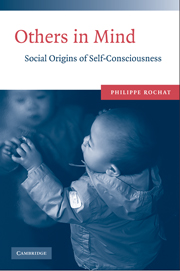Book contents
- Frontmatter
- Contents
- Foreword by Jerôme Bruner
- Preface
- Introduction: Main Ideas
- 1 Self-Conscious Species
- 2 Six Propositions
- 3 Varieties of Self-Reflective Mind State
- 4 Mind States in Development
- 5 Birth of Self-Consciousness
- 6 Shame and Self-Knowledge
- 7 The Roots of Guilt
- 8 Giving and Sharing
- 9 Origins of Owning and Sharing
- 10 Social Construction of Identity
- Conclusion: Moral Space and the Self
- Postscript Note
- References
- Index
7 - The Roots of Guilt
Published online by Cambridge University Press: 05 August 2012
- Frontmatter
- Contents
- Foreword by Jerôme Bruner
- Preface
- Introduction: Main Ideas
- 1 Self-Conscious Species
- 2 Six Propositions
- 3 Varieties of Self-Reflective Mind State
- 4 Mind States in Development
- 5 Birth of Self-Consciousness
- 6 Shame and Self-Knowledge
- 7 The Roots of Guilt
- 8 Giving and Sharing
- 9 Origins of Owning and Sharing
- 10 Social Construction of Identity
- Conclusion: Moral Space and the Self
- Postscript Note
- References
- Index
Summary
I feel the ghosts breathing on my neck.
Molina, Magnolia Electric Co. “What comes after the blues”No one is immune to guilt. Sociopaths apart, it is a powerful emotional experience that shapes our lives. It is inseparable from the exacerbated preoccupation with reputation that is the cardinal feature of what it means to be human. But how does it come about in development and why? These are the questions of interest for this chapter. Guilt, as is shame, is the expression of the intricate set of representations one holds as to how others might construe and evaluate the self. It is from this set of representations of the self as perceived by others that arises the sense of social reputation and self-esteem, both fundamental in determining the perception of who we are.
At the origin of development, however, what we express are nonevaluative emotions or affects that are direct responses to environmental circumstances determined by events occurring within or without the body. We are born expressive, but not yet evaluative.
How do we develop from being primarily expressive to become obsessively evaluative, starting in the middle of the second year? How do we become, from this point on, so inclined to factor in others' views and values about us?
This developmental question is the Holy Grail of human self-consciousness, and I address it first. This will serve as a basis for a discussion of the differences between guilt and shame as evaluative, secondary emotions.
- Type
- Chapter
- Information
- Others in MindSocial Origins of Self-Consciousness, pp. 118 - 129Publisher: Cambridge University PressPrint publication year: 2009



